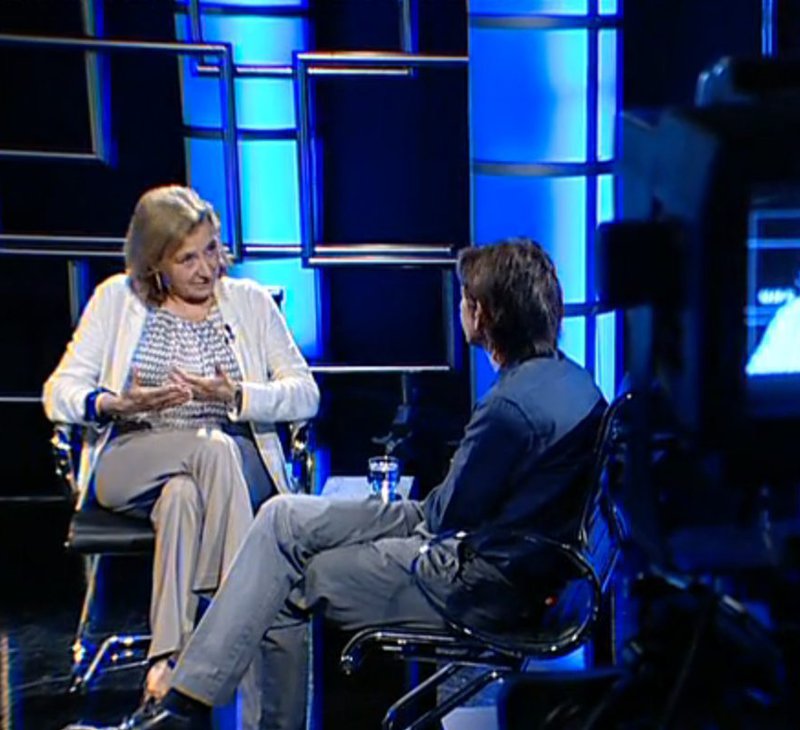Interview
On effort and motivation
Neus Figueras Every Monday at 6.30pm, El Punt Avui TV airs the interview series Going Native. This week, Neil talks to educator and English language consultant and teacher trainer, Neus Figueras.
You have had a lifetime working with English. What is your personal story of living with English?
Well, I started quite late with my English; I did most of my learning locally and it has taken a long time. When I started learning English, I was something like 14 years old, because at that time we did French at school. I first started learning English at the American Institute because my dad thought that his girls, his daughters, had to learn to drive, to swim and to speak languages. We went to the American Institute because at the British Council they wouldn't have me because I was not 16, so I did all my terms at the American Institute. Then, I went to the Escola Oficial d'Idiomes and then to the British Council. I then did my degree in English studies, and the turning point was doing my diploma of English studies at the British Council, here in Barcelona, where I learnt much more than I did during my degree. My second turning point was when I decided to do my PhD, and I started travelling more regularly to places like the UK.
How did you reach that extra level of English. Did it just come or did you have to work for it?
I just couldn't stop. The good thing about being a teacher of English and not being a native speaker is that you know what your students are going through. The other issue is not as nice and it is that you know that you are not a native speaker and you need to have answers for everything, and there is always something that you don't know. To be a native speaker you need to be born somewhere like the UK, but you can speak as well as those people if you put in enough effort. It also has a lot to do with internal motivation. It's about effort and internal motivation, and then you can't stop. I like watching films in English, I like going to the UK and to the States, but I also really like Paris, so I can speak French. So, I guess I have an interest in languages.
You mention films. If a film is in English, it's best to watch it in English. Do you think people have finally changed their outlook?
It takes a while because people seem to find it difficult to watch films in original version and at the same time they can watch a Nespresso advertisement and see George Clooney and he speaks in English and they don't seem to worry about that.
It's the context, maybe?
Maybe it's the context and also going abroad. You cannot learn English here in Spain, you have to go to the UK is something people say that is true. I've been to the UK very often, but I learnt here, going to classes with excellent teachers. Some of them were natives, some of them were non-natives.
There seems to be a contradiction between the formal structure of passing levels and this idea of having a language as a part of your life.
I think that in Spain, and also in Catalonia, we are a bit obsessed with qualifications, what I call “titulitis”. And I think it is more with individuals and parents than with companies, because big companies, when they want somebody who speaks English, they want somebody who speaks English, not somebody who has got a certificate. We seem to organise our learning through certificates rather than progress.
Is it better people start learning English as early as possible, or hen they are a little bit older?
The younger you start, the better it goes. Yet, it also depends on what your target is: if you want to speak like a native speaker, you may want to start very early, but it is possible to speak decent English so that everybody can understand you and so that you can just speak your mind.
Is the teaching better now than it was before?
I think that teachers' ability, in terms of English, has gone up dramatically, and I think there are now very good teachers. But it is very difficult to say. And also, with education, I think that we focus more on what is not working than on what is working.
To change a whole culture is a long-term process, maybe we just need to be more patient?
This is really a political problem because politicians have a four-year period to prove themselves. Even though in Catalonia we've had the same party in power for many years, governments change all the time, and ministers change all the time. Every four years we seem to have to change so many things: education laws change, strategic plans change...so teachers end up opening the book and just following the book.
Leave a comment
Sign in.
Sign in if you are already a verified reader.
I want to become verified reader.
To leave comments on the website you must be a verified reader.
Note: To leave comments on the website you must be a verified reader and accept the conditions of use.

